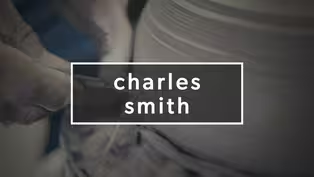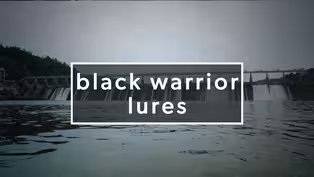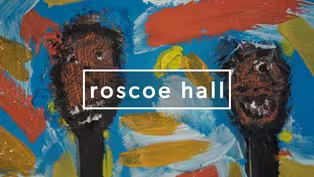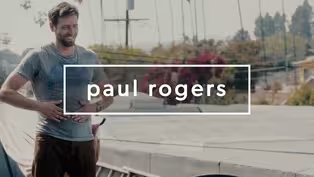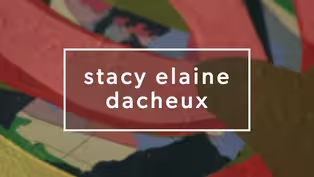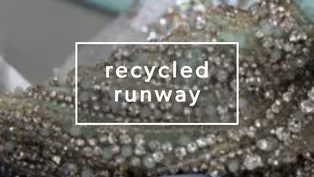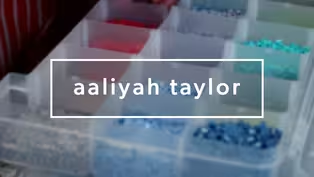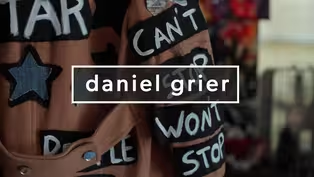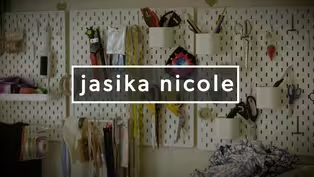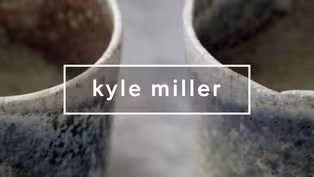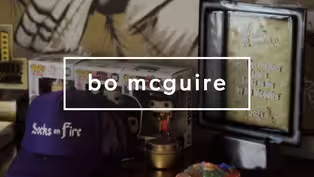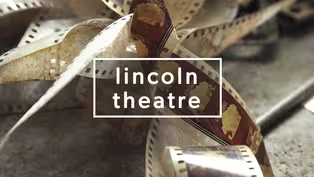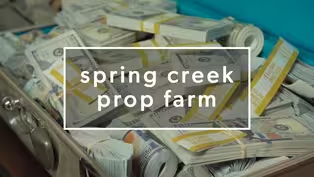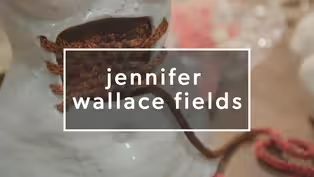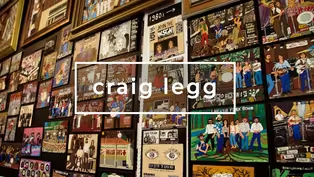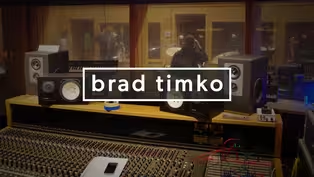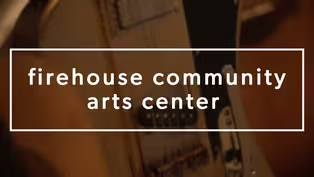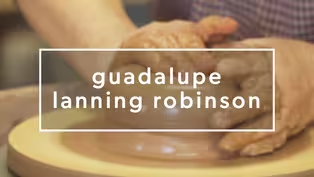Monograph
Roscoe Hall
Clip: Season 5 | 8m 19sVideo has Closed Captions
Chef and painter Roscoe Hall brings his life's experiences together to find his own voice.
Literally raised in the shadow of Alabama BBQ institution, Dreamland, Roscoe Hall set out to travel the country and learn from the best chefs in the best restaurants – all while honing his artistic vision. Returning to Alabama in the 2000’s, Roscoe dug into his Alabama roots and his own history to create paintings now featured in galleries around the world.
Problems playing video? | Closed Captioning Feedback
Problems playing video? | Closed Captioning Feedback
Monograph is a local public television program presented by APT
Monograph
Roscoe Hall
Clip: Season 5 | 8m 19sVideo has Closed Captions
Literally raised in the shadow of Alabama BBQ institution, Dreamland, Roscoe Hall set out to travel the country and learn from the best chefs in the best restaurants – all while honing his artistic vision. Returning to Alabama in the 2000’s, Roscoe dug into his Alabama roots and his own history to create paintings now featured in galleries around the world.
Problems playing video? | Closed Captioning Feedback
How to Watch Monograph
Monograph is available to stream on pbs.org and the free PBS App, available on iPhone, Apple TV, Android TV, Android smartphones, Amazon Fire TV, Amazon Fire Tablet, Roku, Samsung Smart TV, and Vizio.
Providing Support for PBS.org
Learn Moreabout PBS online sponsorship- It is difficult to be a Black painter in America right now, and way before, obviously, but in my spoiled generation, you can get pigeonholed by telling Black stories.
And that's funny 'cause not everyone knows 'em, you know, but here's the deal.
If you're painting Black people on canvas, right, people look at it as if it's like just the same old story about Black people, and but really, you're telling a whole different story.
Moved to Alabama probably in '93.
Mother lived in Tuscaloosa with my family who started Dreamland.
I grew up in the restaurant, like when I came home on Fridays, I'd have to go into the restaurant behind the bar and say hello to her, talk about homework.
And then Dreamland took off.
I became...
I got comfortable, I guess, in the restaurants from being around her, you know?
Just talking in front of customers and paying attention.
Like not paying attention to other people, just knowing it was like our connection.
But my mom always made sure I experienced art, and our house was covered in art, like scary paintings of James Brown and Miles Davis.
Like scary as (beep).
Like it was like, you know, "The Cosby Show" was also a huge introduction.
I guess I can't say that, but whatever.
"Cosby Show" had excellent art collection.
It rotated constantly.
Like the famous procession piece with like the Black family walking down with the umbrellas.
I'd copy that all the time.
Like we were seeing Black art in America actually on TV.
When I started cooking, I started cooking because a bunch of punk kids started cooking and I knew that was an easy way to get a job.
It was like dish washing.
You become a line cook, you get free food, and you get a little paycheck.
I just thought it was a job, 'cause I always used it as survival to move places.
When I graduated college and left Bottega and went to San Diego and started working out West, 'cause back then California cuisine was like the way Korean food is now.
You know?
Like the way kimchi is now, eating a fig wrapped in prosciutto was that in the '90s.
It was like so hot, and farmer's markets were a thing that wasn't a thing.
So it was exciting.
But I remember getting my first job at Chez Panisse.
Two years, I was homeless in San Francisco while I worked at one of the best restaurants in the United States.
I paid a thousand bucks a month to park my car and I'd stayed in an abandoned house next to Gilman Street where like Rancid and AFI, I mean, all those dudes are from.
And there was a bunch of cooks randomly, and a bunch of like punk kids who crashed at this house.
So I'd either stay there after work or I'd go like partying with a girl and then I would go back to my car.
I'd take the bus to my car and change clothes and go to one of the nicest restaurants.
New York, went to Momofuku, that changed my whole perspective on what I was doing as a chef.
It made me feel like I'm part of a team again.
It was diverse.
It was like that punk rock (beep) is more of a lifestyle.
Like we are professionals.
And that's when it like turned up a little bit.
And then I moved to Portland, Oregon, and kinda low key, like I cooked at every restaurant Portland had, but like, I went strictly art and did pop-ups every now and then, like in illegal spaces, would get tickets.
I think the entire time I was learning how to be a chef, I learned, I only cooked European American cuisine.
Like I didn't know where I fit in the culinary world until I moved back to Alabama.
Like, and then I found my wedge.
I found a voice to like what my food is and what I could serve and what I would call like a dish that made sense.
And that's when like art and food kind of jelled up.
When I moved back here, I was like, "I wanna tell my own story a little bit."
Like I wanna talk about like crack and like I'm tired of talking about the '60s and the '50s.
I wanna talk about the '80s and the '90s.
Like let's talk about "New Jack City" and like what crack did.
Like crack really affected me.
My parents, my dad was a crackhead, my uncle was a crackhead.
Everybody was a crackhead.
Like everybody.
I remember growing up in Chicago and seeing our family was so well together.
Like the whole community was great.
It was like being in "The Cosby Show."
And then when crack hit like '87, everything, you had to grow up so much faster.
You know?
Like you ended up being a protector of your own.
It was really weird.
A kid shouldn't have to... At age 10, you just don't want to do all that.
And I'm trying to tell that story of negligence of like how do you build a community outta like just being numb, you know?
'Cause like if you go through all that 26 years, 27 years, whatever, of trying to hit a level of excellence for someone else, someone else's vision, trying to code shift or whatever in order to get in the door in those places, in order to be seen in the art world, in order to do all that, you go through the crack era and you grow up a little bit too fast.
Like (indistinct), you get shot by the clan.
Like you get really numb and like sterile, and you forget that you are a representation of where you come from.
So I felt like it was time to tell a weird like Black punk like folk art kind of story.
And that's where the narrative got deeper.
I always wanted to figure out how to like incorporate the food culture part of me into the painting without being like, "I paint apples."
And I can't even paint an apple.
But, so the only way I could think about that was to use the spices that make recipes delicious and figure out how to make pigments out of them.
And then so that became like turmeric, black pepper.
When I worked at Rodney Scott's, we started building our own charcoal, and I was like, "Oh man, I could take that home, pulse it up in the food processor and use that as my charcoal and like dust my paintings.
And it also would tell a story about regionality and the Creole-ness of who I am."
I've learned so much about the south through, I learn more about regions through food than I do anything, obviously.
But luckily I still cook private affairs where I work at a farm sometimes.
Like I can still dig deeper to like the origins of where things come from and I'm using produce to create my own pigments.
Like it just gets weirder.
But I would say the more I dig deeper, the more I enjoy the southeast, 'cause it's more I know the truth almost.
As much I think.
I can believe in something that I think is true.
If I'm gonna create legacy in some sense of not a monetary gain at all obviously, but in some sense of that's gonna last long and my work can hit museums and be on a wall, beyond the ingredients that go into it, it better have an amazing story that encompasses like what I thought about the time of my region and like what it expresses.
And my kids, if they don't like it or not, they'll be able to be like, "That's his stuff, he was talking about this.
He was so angry.
He loved okra."
You know?
(laughs)
Video has Closed Captions
Clip: S5 | 6m 47s | Charles Smith shows you where to find the story hidden in plain sight. (6m 47s)
Video has Closed Captions
Clip: S5 | 6m 59s | A fisherman outside of Tuscaloosa is always finding new ways of doing things. (6m 59s)
Video has Closed Captions
Clip: S5 | 8m 19s | Chef and painter Roscoe Hall brings his life's experiences together to find his own voice. (8m 19s)
Video has Closed Captions
Clip: S5 | 6m 15s | Oscar-winner Paul Rogers on the value of collaboration and the core of outstanding work. (6m 15s)
Video has Closed Captions
Clip: S5 | 5m 9s | Painter and writer Stacy Elaine Dacheux (5m 9s)
Video has Closed Captions
Clip: S5 | 5m 45s | Birmingham youths transform old clothes into high fashion. (5m 45s)
Video has Closed Captions
Clip: S5 | 6m 54s | Birmingham, Alabama jewelry and clothing designer, Aaliyah Taylor (6m 54s)
Video has Closed Captions
Clip: S5 | 4m 34s | Highlighting the world of fashion in the Magic City with Daniel Grier (4m 34s)
Video has Closed Captions
Clip: S5 | 7m 45s | Actor and maker based in Los Angeles, Jasika Nicole (7m 45s)
Video has Closed Captions
Clip: S5 | 4m 43s | Fairhope, Alabama ceramics artist, Kyle Miller (4m 43s)
Video has Closed Captions
Clip: S5 | 5m | Poet and Filmmaker Bo McGuire from Gadsden, AL (5m)
Video has Closed Captions
Clip: S5 | 6m 14s | The story of Bessemer's historically Black theater and efforts to restore it. (6m 14s)
Video has Closed Captions
Clip: S5 | 5m 37s | tour spring creek film prop farm in montevallo alabama (5m 37s)
Video has Closed Captions
Clip: S5 | 7m | A studio visit with ceramic artist Jennifer Wallace Fields (7m)
Video has Closed Captions
Clip: S5 | 4m 50s | Craig Legg's Birmingham rock and roll retrospective. (4m 50s)
Video has Closed Captions
Clip: S5 | 4m 48s | Visit a historic recording studio near Muscle Shoals (4m 48s)
Firehouse Community Arts Center
Video has Closed Captions
Clip: S5 | 5m 54s | Firehouse Community Arts Center in Avondale, AL (5m 54s)
Video has Closed Captions
Clip: S5 | 4m 33s | Alabama based potter stays grounded to her Mexican roots through her craft (4m 33s)
Providing Support for PBS.org
Learn Moreabout PBS online sponsorship

- Arts and Music
The Best of the Joy of Painting with Bob Ross
A pop icon, Bob Ross offers soothing words of wisdom as he paints captivating landscapes.












Support for PBS provided by:
Monograph is a local public television program presented by APT
